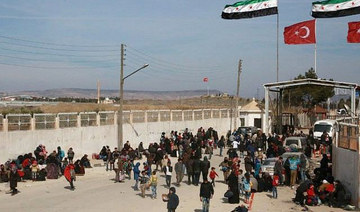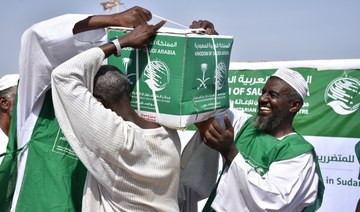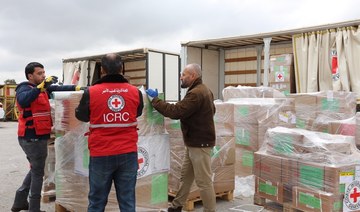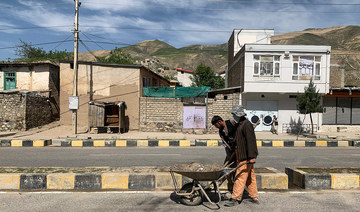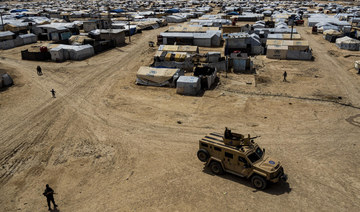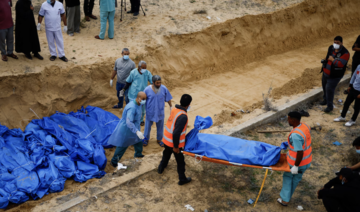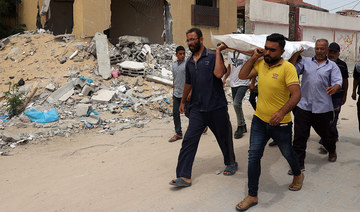BEIRUT: An impasse at the United Nations over a border crossing with Syria’s last rebel-held enclave is putting 4.1 million Syrian there in danger, the president of the International Rescue Committee warned this week.
David Miliband’s comments came more than two weeks after the UN Security Council failed to renew the mandate for the Bab Al-Hawa border crossing between Syria and Turkiye, which secures aid for Syrians in the enclave.
The vast majority of people in northwestern Syria live in poverty and rely on aid to survive — a crisis that was further worsened by a devastating magnitude 7.8 earthquake that hit southern Turkiye and northern Syria in February. The earthquake killed more than 50,000 people, including over 6,000 in Syria, according to the United Nations. The quake also displaced hundreds of thousands of others.
“The people of northwest Syria can ill afford a new wave of suffering, having lived through the trauma of the earthquake,” Miliband told The Associated Press in an interview on Tuesday.
He urged the Security Council to “do its job” and resume the humanitarian border crossing.
The council earlier in July failed to adopt one of two rival resolutions on the crossing. Russia, a top ally of the Syrian government in Damascus, vetoed a Swiss-Brazilian compromise resolution backed by Western countries that renewed authorization for the crossing of aid through Bab Al-Hawa for six months. Moscow’s draft resolution with additional requirements — including increasing aid delivery to the opposition enclave through Damascus — only received China’s backing.
The paralysis also comes as donor fatigue has led to aid cuts in aid to both northwestern Syria and neighboring countries hosting millions of Syrian refugees who fled the ongoing conflict, now in its 13th year.
Syrian President Bashar Assad opened two additional crossing points from Turkiye at Bab Al-Salameh and Al-Rai to increase the aid flow to the quake victims. The UN says that some 85 percent of its aid to northwestern Syria goes through Bab Al-Hawa, a more efficient route.
For the moment, Miliband said the International Rescue Committee is trying to cope by using other crossings and finding other ways of getting aid into the enclave.
“Our point of view is that interference with the humanitarian crossing point poses severe danger to the efficiency and the effectiveness of humanitarian aid,” he explained.
Additionally, the United States said Monday that it has joined major donors in demanding the UN be able to deliver aid through Bab Al-Hawa independently and to everyone in need — a rejection of conditions set by Syria and backed by its ally Russia that Damascus control all aid and banning UN communications with rebels in the region.
The Security Council initially authorized aid deliveries in 2014 from Turkiye, Iraq and Jordan through four border crossing points into rebel-held areas in Syria.
However, Russia, backed by China, over the years successfully applied pressure to reduce the authorized crossings to just Bab Al-Hawa, and the mandates from a year to six months.
Moscow alleges that militant groups in the northwestern province of Idlib are taking the aid and preventing it from reaching families in need. Russia and China have been calling for all aid to be routed through Damascus instead.
But Syrians in the northwestern enclave, as well as Western countries critical of Assad, say they are skeptical of the push.
“There’s a lot of danger for people in need in northwest Syria,” Miliband said. “And it’s very important that they’re not forgotten.”
Aid group official warns that impasse at the UN on border crossing puts 4.1 million Syrians at risk
https://arab.news/njd93
Aid group official warns that impasse at the UN on border crossing puts 4.1 million Syrians at risk
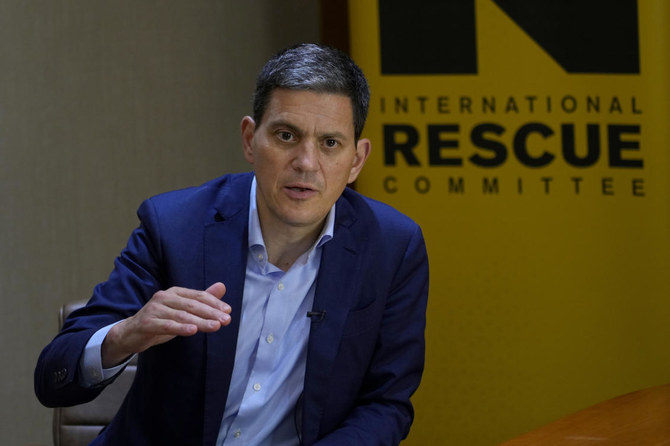
- The vast majority of people in northwestern Syria live in poverty and rely on aid to survive
- The Security Council initially authorized aid deliveries in 2014 from Turkiye, Iraq and Jordan through four border crossing points
Fighting with ‘heavy weaponry’ in Sudan’s El-Fasher: UN

- The United States last month warned of a looming rebel military offensive on the city, a humanitarian hub that appears to be at the center of a newly opening front in the country’s civil war
PORT SUDAN: A senior UN official expressed concern late Saturday at reports that heavy weapons were being used in fighting in the Sudanese city of El-Fashur.
Wounded civilians were being rushed to hospital and civilians were trying to flee the fighting in the Darfur region, said a statement from Clementine Nkweta-Salami, the UN’s humanitarian coordinator for Sudan.
“I am gravely concerned by the eruption of clashes in (El-Fashur) despite repeated calls to parties to the conflict to refrain from attacking the city,” said Nkweta-Salami.
“I reiterate — the violence threatens the lives of over 800,000 civilians” who live in the city.
“I am equally disturbed by reports of the use of heavy weaponry and attacks in highly populated areas in the city center and the outskirts of (El-Fashur), resulting in multiple casualties,” she added.
The United States last month warned of a looming rebel military offensive on the city, a humanitarian hub that appears to be at the center of a newly opening front in the country’s civil war.
Tunisian police arrest prominent lawyer critical of president

- Dozens of lawyers took to the streets in protest on Saturday night, carrying banners reading “Our profession will not kneel” and “We will continue the struggle” Saied came to power in free elections in 2019
TUNIS: Tunisian police stormed the building of the Deanship of Lawyers on Saturday and arrested Sonia Dahmani, a lawyer known for her fierce criticism of President Kais Saied, and then arrested two journalists who witnessed the confrontation, a journalists’ syndicate said.
Two IFM radio journalists, Mourad Zghidi and Borhen Bsaiss, were arrested, an official in the country’s main journalists’ syndicate told Reuters. The incident was the latest in a series of arrests and investigations targeting activists, journalists and civil society groups critical of Saied and the government. The move reinforces opponents’ fears of an increasingly authoritarian government ahead of presidential elections expected later this year.
Dahmani was arrested after she said on a television program this week that Tunisia is a country where life is not pleasant. She was commenting on a speech by Saied, who said there was a conspiracy to push thousands of undocumented migrants from Sub-Saharan countries to stay in Tunisia. Dahmani was called before a judge on Wednesday on suspicion of spreading rumors and attacking public security following her comments, but she asked for postponement of the investigation.
The judge rejected her request. Dozens of lawyers took to the streets in protest on Saturday night, carrying banners reading “Our profession will not kneel” and “We will continue the struggle” Saied came to power in free elections in 2019. Two years later he seized additional powers when he shut down the elected parliament and moved to rule by decree before assuming authority over the judiciary.
Since Tunisia’s 2011 revolution, the country has won more press freedoms and is considered one of the more open media environments in the Arab world. Politicians, journalists and unions, however, say that freedom of the press faces a serious threat under the rule of Saied. The president has rejected the accusations and said he will not become a dictator.
Syrian Kurdish force hands over 2 Daesh members suspected in 2014 mass killing of Iraqi troops

- Iraq has, over the past several years, put on trial and later executed dozens of Daesh members over their involvement in the Speicher massacre
BEIRUT: Syria’s US-backed Kurdish-led force has handed over to Baghdad two Daesh militants suspected of involvement in mass killings of Iraqi soldiers in 2014, a war monitor said.
The report by the Syrian Observatory for Human Rights came a day after the Iraqi National Intelligence Service said it had brought back to the country three Daesh members from outside Iraq. The intelligence service did not provide more details.
Daesh captured an estimated 1,700 Iraqi soldiers after seizing Saddam Hussein‘s hometown of Tikrit in 2014. The soldiers were trying to flee from nearby Camp Speicher, a former US base.
BACKGROUND
Daesh captured an estimated 1,700 Iraqi soldiers after seizing Saddam Hussein‘s hometown of Tikrit in 2014.
Shortly after taking Tikrit, Daesh posted graphic images of Daesh militants shooting and killing the soldiers.
Farhad Shami, a spokesman for the Kurdish-led Syrian Democratic Forces, said the US-backed force handed over two Daesh members to Iraq.
It was not immediately clear where Iraqi authorities brought the third suspect from.
The 2014 killings, known as the Speicher massacre, sparked outrage across Iraq and partially fueled the mobilization of militias in the fight against Daesh.
Iraq has, over the past several years, put on trial and later executed dozens of Daesh members over their involvement in the Speicher massacre.
The Observatory said the two Daesh members were among 20 captured recently in a joint operation with the US-led coalition in the northern Syrian city of Raqqa, once the capital of Daesh’s self-declared caliphate.
Despite their defeat in Iraq in 2017 and in Syria in March 2019, the extremist sleeper cells are still active and have been carrying out deadly attacks against SDF and Syrian government forces.
Shami said a car rigged with explosives and driven by a suicide attacker tried on Friday night to storm a military checkpoint for the Deir El-Zour Military Council. This Arab majority faction is part of the SDF in the eastern Syrian village of Shuheil.
Shami said that when the guards tried to stop the car, the attacker blew himself up, killing three US-backed fighters.
No one immediately claimed responsibility for the attack, but it was similar to previous explosions carried out by IS militants.
The SDF is holding over 10,000 captured Daesh fighters in around two dozen detention facilities, including 2,000 foreigners whose home countries have refused to repatriate them.
Protesters return to streets across Israel, demanding hostage release

- Family members of the hostages, carrying pictures of their loved ones still in captivity, joined the crowds that demonstrated in Tel Aviv
TEL AVIV: Thousands of Israelis took to the streets on Saturday demanding that Prime Minister Benjamin Netanyahu’s government do more to secure the release of hostages being held in the Gaza Strip by Islamist group Hamas.
Family members of the hostages, carrying pictures of their loved ones still in captivity, joined the crowds that demonstrated in Tel Aviv.
One of them was Naama Weinberg, whose cousin Itai Svirsky was abducted during Hamas’ Oct. 7 assault on Israeli towns and, according to Israeli authorities, was killed in captivity. In a speech she referenced a video Hamas made public on Saturday, claiming that another of the Israeli captives had died.
“Soon, even those who managed to survive this long will no longer be among the living. They must be saved now,” Weinberg said.
As the evening progressed, some protesters blocked a main highway in the city before being dispersed by police, who used water cannons to push back the crowd. At least three people were arrested.
Hamas’ Oct. 7 attack sparked the devastating war in Gaza, now raging for nearly seven months.
UN Security Council seeks inquiry into mass graves in Gaza

- The UN rights office in late April had called for an independent investigation into reports of mass graves at Al-Shifa and the Nasser Medical Complex in Khan Younis
NEW YORK: The UN Security Council has called for an immediate and independent investigation into mass graves allegedly containing hundreds of bodies near hospitals in Gaza.
In a statement, members of the council expressed their “deep concern over reports of the discovery of mass graves, in and around the Nasser and Al-Shifa medical facilities in Gaza, where several hundred bodies, including women, children and older persons, were buried.”
The members stressed the need for “accountability” for any violations of international law.
They called on investigators to be given “unimpeded access to all locations of mass graves in Gaza to conduct immediate, independent, thorough, comprehensive, transparent and impartial investigations.”
FASTFACT
The World Health Organization said in April that Al-Shifa, in Gaza City, had been reduced to an ‘empty shell,’ with many bodies found in the area.
Hospitals in the Gaza Strip have been repeatedly targeted since the beginning of the Israeli military operation in the Palestinian territory following the October 7 attack on southern Israel by Gaza-based Hamas militants.
The World Health Organization said in April that Al-Shifa, in Gaza City, had been reduced to an “empty shell,” with many bodies found in the area.
The Israeli army has said around 200 Palestinians were killed during its military operations there.
Bodies have reportedly been found buried in two graves in the hospital’s courtyard.
The UN rights office in late April had called for an independent investigation into reports of mass graves at Al-Shifa and the Nasser Medical Complex in Khan Younis.
Gaza officials said at the time that health workers at the Nasser complex had uncovered hundreds of bodies of Palestinians they alleged had been killed and buried by Israeli forces.
Israel’s army has dismissed the claims as “baseless and unfounded.”
The statement on Friday from the Security Council did not say who would conduct the investigations.
But it “reaffirmed the importance of allowing families to know the fate and whereabouts of their missing relatives, consistent with international humanitarian law.”
Israel’s offensive has killed at least 34,943 people in the Gaza Strip, primarily women and children, the Health Ministry in the territory said.



